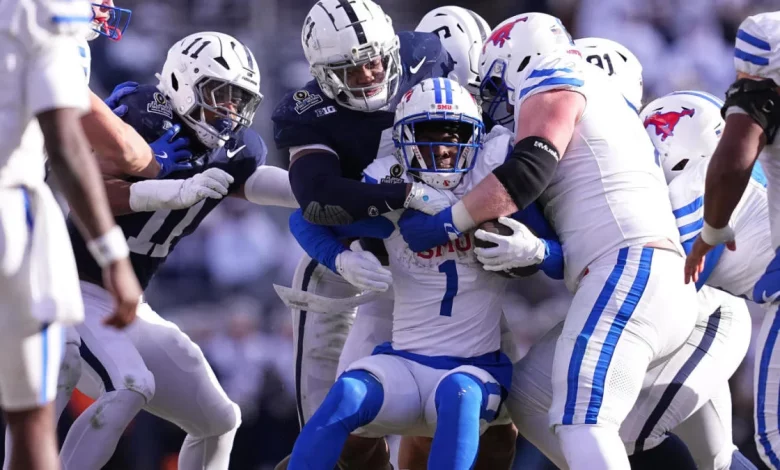Imagine if college football had a playoff system from the start—more excitement, fairer outcomes, and even crazier upsets!

College football has always been one of the most beloved and fiercely contested sports in the United States. Its rich history, with teams battling for supremacy in stadiums full of passionate fans, has helped shape its place in the culture. But one of the most persistent points of debate has been its postseason structure. For many years, college football used a bowl system to determine the national champion, with no real playoff structure in place to ensure the best teams faced off for a definitive title. Instead, teams were selected based on rankings, often leaving fans to wonder whether the best team truly won the national championship.
The introduction of the College Football Playoff (CFP) in 2014 was a major turning point for the sport, as it replaced the Bowl Championship Series (BCS) and offered a four-team, single-elimination format to crown a true champion. While the CFP has been widely praised for its improvements, it raises an interesting hypothetical question: what if college football had always had a playoff system from the very beginning?
What if the playoff format had been implemented from the inception of college football? Would the sport have evolved differently, with more excitement, fairer outcomes, and even crazier upsets? This article explores how the landscape of college football could have changed, how it would have affected teams’ strategies, and what it might have meant for the culture surrounding the sport.
1. A More Exciting, Unpredictable Postseason
The introduction of a playoff system into college football would have significantly altered the postseason experience, particularly in terms of excitement and unpredictability. The bowl system that preceded the playoff often led to predictable matchups and sometimes left fans unsatisfied, as they wondered if the top two teams in the nation were actually facing each other. With a playoff system, the drama would have been enhanced, with high-stakes matchups and more compelling storylines.
In the past, the national champion was often determined by the Associated Press (AP) poll or the Coaches Poll, leaving room for controversy and debate. A playoff system would have eliminated much of this uncertainty, creating definitive answers by pitting the best teams head-to-head on the field. The beauty of a playoff is that it allows for the possibility of upsets and surprises, something that was often missing in the old system.
For instance, take the example of the 2004 Auburn Tigers. The team finished the season undefeated but was left out of the BCS National Championship Game due to the structure of the system. An expanded playoff format could have given Auburn the chance to prove itself on the field, which might have led to a different outcome for the national title that year. With a playoff, Auburn would have been given a more fair opportunity to contend for the championship, which would have given college football fans one of the most exciting, underdog-driven playoff runs in history.
Imagine if other upsets and surprises, like the 2007 season’s “BCS chaos” or Boise State’s thrilling run in 2006, were incorporated into a larger playoff picture. The excitement of those games would have been amplified, with the stakes raised as teams fought for their shot at the title.
A playoff system from the start would have given us more dramatic moments. Teams that might have been left out of the championship discussion in the past would have had a platform to prove themselves. Lesser-known programs, such as TCU in 2014 or UCF in 2017, could have had a chance to show they belonged in the conversation and perhaps even pull off a shocking victory.
2. Fairer Outcomes and a True National Champion
One of the most significant advantages of a playoff system is that it ensures a true national champion is crowned. In the old bowl system, it was often difficult to determine the best team in the country. Many teams finished the regular season with similar records, but only one or two teams would get the chance to prove themselves in a championship bowl game.
Without a playoff system, there was always the possibility that a deserving team was left out of the championship conversation. This often led to fan dissatisfaction and debates over which team truly deserved the title. Take the 2000 college football season, for example. Miami, Florida State, and Oklahoma all finished with strong records, but only one team could claim the national title through the traditional bowl system. With a playoff, the debate would have been settled on the field, with the top teams in the country getting a chance to compete for the title.
A playoff system would have ensured that the best teams in the nation were given an equal opportunity to compete for the championship. Even in years where there were multiple undefeated teams, the playoffs would have allowed them to face off against each other, eliminating much of the controversy surrounding the selection process. Additionally, with a true playoff structure in place, no more would teams have to rely on polls or committee decisions to determine their postseason fate.
Moreover, a playoff format would have given teams with strong but less-known conferences a chance to shine. For example, a team like Utah, which finished unbeaten in 2008 but was passed over for a spot in the BCS National Championship Game, could have been given a chance to prove itself on a national stage. A playoff format would have leveled the playing field, allowing for a more comprehensive and fair evaluation of teams’ performance.
3. A Shift in College Football Strategy
The introduction of a playoff system would have also changed how college football programs approached their regular seasons and recruiting. In the current era of the CFP, coaches and programs tend to schedule tougher non-conference games to enhance their résumés and boost their chances of qualifying for the playoffs. The level of competition in the regular season has increased as a result, leading to a more dynamic and challenging environment for teams.
If the playoff system had existed from the start, schools might have begun scheduling tougher non-conference games earlier, knowing that a spot in the playoff field could be on the line. Teams would have been more focused on performing at a high level throughout the regular season to ensure that they were prepared for a potential playoff berth. Conferences that were historically seen as “weaker” might have received more attention, with teams from the Group of Five (such as the American Athletic Conference or Conference USA) having a realistic chance of earning a playoff spot if they performed well enough.
Recruiting would have also been impacted. Programs would have shifted their attention to building teams capable of making deep runs in the postseason. Recruiting efforts would focus on finding players who could perform on the national stage, and the increased exposure from playoff games would have elevated the profile of teams and players alike. In turn, this could have created a more competitive recruiting environment across the country, with schools in less traditional football hotbeds having the chance to recruit elite talent.
Programs that once would have been content with a bowl appearance would now be aiming for a playoff spot and, ultimately, the national title. This focus on postseason success would have reshaped the priorities of college football programs nationwide and fostered a culture of winning that was centered around a definitive goal: a playoff berth.
4. The Growth of College Football’s National Appeal
A playoff system from the start would have helped propel college football into a more nationally recognized and widely followed sport. The four-team College Football Playoff is already one of the most-watched annual sporting events in the U.S., and an expanded playoff format would have only heightened the drama and excitement surrounding college football’s postseason.
If the playoff system had existed from the very beginning, the sport might have seen even earlier growth in terms of national interest and media attention. More teams from more regions would have had the opportunity to play for a national title, expanding the sport’s appeal to fans in traditionally less prominent football regions. Imagine the kind of buzz that would have surrounded a 2007 matchup between Appalachian State and Michigan in a playoff game. The small-school Cinderella stories that would emerge in the early rounds of the playoffs would only have helped grow the sport’s appeal.
Additionally, the playoffs would have likely encouraged greater investment in college football programs, leading to enhanced facilities, better recruiting budgets, and increased media rights deals. The excitement surrounding the tournament would have given college football more exposure, especially during the offseason, when many other sports are in a lull. National TV deals and sponsorships would have grown rapidly, benefiting the sport on every level.
5. A New Era of Upsets and Underdogs
One of the most thrilling aspects of any playoff system is the unpredictability it brings, particularly the potential for upsets. College football, with its deep pool of talented teams and varied styles of play, is primed for unexpected results. In a world where the postseason was determined by a playoff from the beginning, we would have likely seen even more upsets and Cinderella stories unfold.
Teams that came from less powerful conferences, with fewer resources or star players, would have had more chances to pull off shocking victories. Remember the incredible 2006 Fiesta Bowl between Boise State and Oklahoma, where Boise pulled off a stunning win? In a system where every team had a shot at the national title, games like that could have been more common, as teams that were once overlooked were given the chance to take down Goliaths in the postseason. The drama of the underdog advancing through the playoffs would have injected even more excitement into college football, making it even more thrilling for fans.
The Legacy of a Hypothetical Playoff System
If college football had implemented a playoff system from the start, it would have fundamentally altered the landscape of the sport in numerous ways. From the increased excitement of the postseason to fairer outcomes and a true national champion, the sport would have likely enjoyed a more dynamic and inclusive culture. More upsets, more drama, and more opportunities for underdog programs would have kept fans on the edge of their seats for years. The sport might have grown even faster, reaching new heights in terms of popularity, national exposure, and cultural significance.
Though the playoff system is still a relatively new addition to the college football postseason, its influence is already being felt, and its legacy will continue to shape the future of the sport for years to come. If college football had always had a playoff system, who knows just how much different things would have been—and how much more exciting our Saturdays in the fall would have been.








